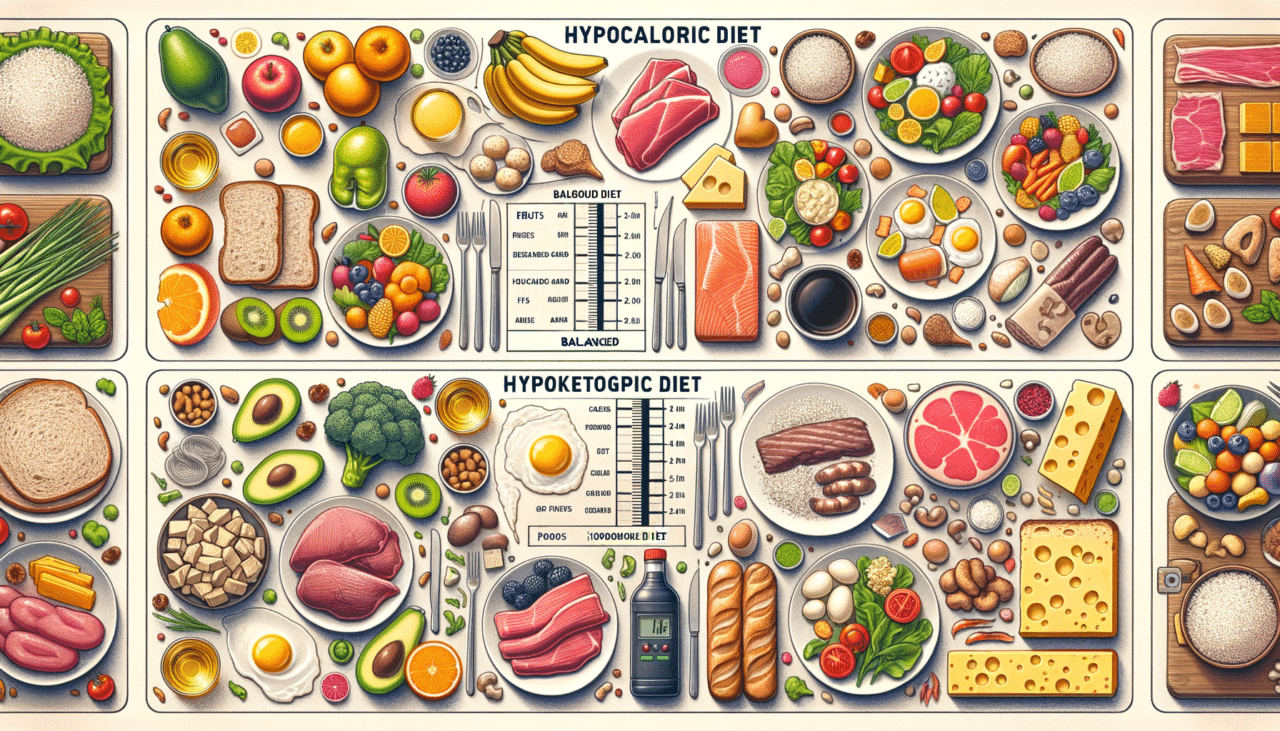When it comes to choosing a diet plan, understanding the nuances and benefits of each option is crucial. Two popular diets often discussed are the Hypocaloric Diet and the Hypoketogenic Diet. While both aim to support weight loss and improve health, they approach these goals through different mechanisms. This article will delve into the details of each diet and offer a comprehensive comparison to help you make an informed decision.
Understanding the Hypocaloric Diet
Characteristics of a Hypocaloric Diet:
- Calorie Restriction: The primary focus of a hypocaloric diet is to reduce the total daily caloric intake. This deficit forces the body to utilize stored energy, leading to weight loss.
- Balanced Nutrition: Although calorie intake is reduced, a hypocaloric diet typically allows for a varied and balanced intake of macronutrients, including carbohydrates, proteins, and fats, ensuring essential nutrients are consumed.
- Flexibility: This diet can be tailored to individual needs and preferences, allowing for a wide range of foods as long as the caloric goal is maintained.
- Sustainability: By not eliminating entire food groups, a hypocaloric diet can be easier to maintain long-term compared to more restrictive diets.
Benefits of a Hypocaloric Diet:
- Weight Loss: Effective for those looking to lose weight by creating a caloric deficit.
- Cardiovascular Health: May improve heart health by reducing body weight and lowering blood pressure.
- Metabolic Improvements: Can enhance metabolic parameters such as blood sugar and cholesterol levels.
Understanding the Hypoketogenic Diet
Characteristics of a Hypoketogenic Diet:
- Low Carbohydrate Intake: A hypoketogenic diet is characterized by a significant reduction in carbohydrate consumption, usually to less than 50 grams per day.
- High Fat Intake: This diet emphasizes consuming high amounts of healthy fats to encourage the body to enter a state of ketosis, where it burns fat for fuel instead of carbohydrates.
- Moderate Protein: Protein intake is kept moderate to ensure muscle maintenance while avoiding excess that could interfere with ketosis.
- Structured Meal Planning: Requires careful planning and tracking of macronutrient intake to maintain the state of ketosis.
Benefits of a Hypoketogenic Diet:
- Rapid Weight Loss: Often results in quick initial weight loss due to water loss and fat burning.
- Appetite Control: The high-fat content can help reduce hunger and promote satiety.
- Improved Energy Levels: Some individuals report increased energy and mental clarity while in ketosis.
- Therapeutic Uses: May have benefits for certain neurological conditions, including epilepsy.
Comparative Table: Hypocaloric Diet vs. Hypoketogenic Diet
| Feature | Hypocaloric Diet | Hypoketogenic Diet |
|---|---|---|
| Primary Focus | Calorie reduction | Carbohydrate reduction |
| Macronutrient Balance | Balanced | High fat, low carb, moderate protein |
| Flexibility | High | Low |
| Sustainability | Generally sustainable | Can be challenging long-term |
| Initial Weight Loss | Moderate | Rapid |
| Health Benefits | Cardiovascular, metabolic improvements | Appetite control, potential neurological benefits |
| Meal Planning | Less structured | Highly structured |
| Common Foods | Varied (fruits, vegetables, grains) | Meat, fish, eggs, dairy, low-carb vegetables |
Choosing the Right Diet for You
When deciding between a hypocaloric and a hypoketogenic diet, consider your lifestyle, eating preferences, and health goals. A hypocaloric diet may be more suitable for those seeking a balanced approach with a variety of foods. In contrast, a hypoketogenic diet could be ideal for individuals looking for rapid weight loss and who are comfortable with more dietary restrictions.
Conclusion
Both the Hypocaloric and Hypoketogenic diets have their unique advantages and challenges. Understanding these differences can help you choose the best dietary approach for your individual needs and goals. Whether you prioritize flexibility or rapid results, making an informed choice will aid in achieving long-term health and wellness.

Comments (0)
There are no comments here yet, you can be the first!